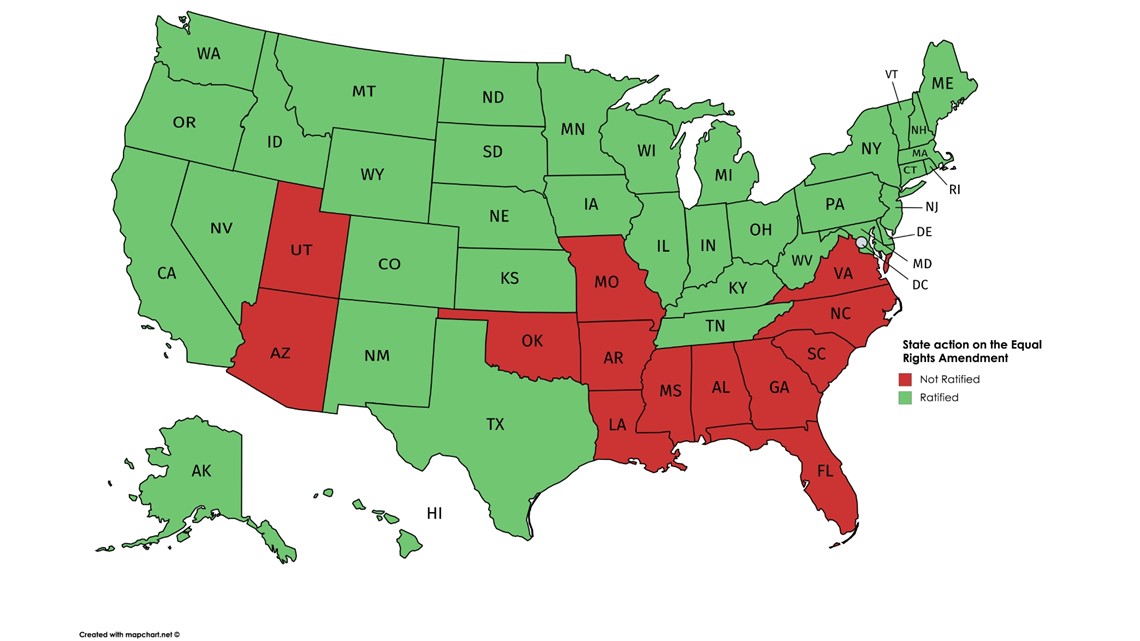Americans are more politically polarized than ever, and the Pew Research Center has found the gap is only widening.
Despite our differences, you might think we could agree that men and women should have equal rights in 2018.
Yet, forty-six years after being adopted by Congress, the Equal Rights Amendment stands one state legislature shy of ratification by the three-fourth of the states.
What is the Equal Rights Amendment?
Green-lighted by the U.S. House in 1971 and the Senate in 1972, the proposed U.S. constitutional amendment says women cannot be denied equal rights on the basis of their sex.
Originally penned by women’s rights activists Alice Paul and Crystal Eastman, the text has barely changed since it was first introduced to Congress during the Roaring Twenties.
The version that got through Congress said: "Equality of rights under the law shall not be denied or abridged by the United States or by any state on account of sex."
Process that for a moment.
In nearly a century, our nation hasn’t been able to collectively agree that people shouldn’t be discriminated against based on whether they’re male or female.
Why am I hearing about this now?
The Equal Rights Amendment needed to be ratified by just three more states when its deadline expired in 1982. At that point, 35 state legislatures had said yes – but 38 were needed to reach the three-fourths threshold laid out in the constitutional amendment process.
Reinvigorated – at least in part – by the “Me Too” movement, grassroots activists have recently re-launched a push to get federal lawmakers to either repeal the deadline or begin the amendment process again.
This year, Illinois became the 37th state to ratify the ERA.
The following states still haven’t: Alabama, Arizona, Arkansas, Georgia, Louisiana, Mississippi, Missouri, North Carolina, Oklahoma, South Carolina, Utah, Virginia…and oh yes, Florida.
That’s right. Florida is among the holdouts.


What about the 14th Amendment?
Supporters argue although the U.S. Supreme Court has interpreted the 14th Amendment to mean no state should deprive “any person” of their rights, the court has repeatedly declined to raise sex discrimination claims to the “strict scrutiny” review standard it requires when dealing with other issues like religion and race.
Before his death, the late Supreme Court Justice Antonin Scalia argued in an interview that the Constitution does not protect against sex discrimination.
Advocates for the ERA saw that as further evidence that women’s rights should be in writing.
What do critics say?
Critics of the ERA argue it could require women to be drafted into the military, give the federal courts too much power to reinterpret laws and possibly change social security benefits for wives and widows.
In a 2014 article, the Illinois Family Institute claimed the proposed amendment was misleading and cited a U.S. House Judiciary Committee Report that indicated it could even one day eliminate child support if interpreted in a particular way.
In a June opinion column for the Washington Post, American political commentator George Will said the ERA was dead, and it should stay that way.
State-level equal rights amendments
Several legislatures have passed their own state-level versions of the Equal Rights Amendment.
One of them is Florida.
Although Florida hasn’t ratified the federal version, it added text to its state constitution – saying “all nature persons, female and male alike, are equal…”
Who knows? Maybe one day the Sunshine State will ratify the federal version, too.
In the meantime, dozens of states don’t have such protections – at least not explicitly.
►Make it easy to keep up-to-date with more stories like this. Download the 10News app now.
Have a news tip? Email desk@wtsp.com, or visit our Facebook page or Twitter feed



